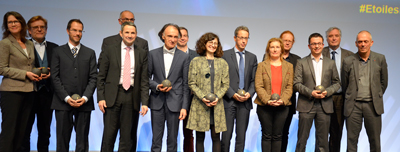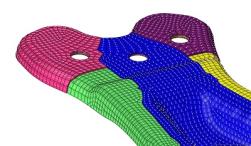Headlines
Back > Headlines

An Étoile de l’Europe for the Supreme project
Sophie Sieg-Zieba was awarded an Étoile de l’Europe for the European programme Supreme by the jury of the 2016 edition. In being received by its coordinator, this award honours a team of 10 European partners and three years of research work that led to an industrially-tested solution.
Sophie Sieg-Zieba won an Étoile de l’Europe for the Innovation category!
The coordinator of the European research and innovation project, Supreme, received her prize during a ceremony organised on 5 December 2016 by the Department of the Junior Minister of Higher Learning and Research and attended by the Junior Minister himself.
This achievement recognises the work of Cetim through its coordinator and of the nine other partner researchers and industrial manufacturers.
The Étoiles de l’Europe awards were started in France in December 2013 at the launch of Horizon 2020, an EU research and innovation programme. This initiative seeks in particular to “honour teams of researchers and their coordinators for their European commitment and their project coordination and rallying efforts”. In 2015, twelve leading figures were honoured for their achievements.
A solution for preventive maintenance
Of its overall budget of 4.5 million Euros, Supreme (Sustainable Predictive Maintenance for Manufacturing Equipment) was allocated 3.3 million Euros in funding by the European Union for a three-year period. Within Cetim, a multidisciplinary team coordinated by Sophie Sieg-Zieba joined forces with nine other partners to find solutions for optimising industrial processes and failure prediction.
The developed solution is based on a multi-sensor approach (vibrations, torque, electric current, acoustic emission) and embedded intelligence to detect and visualise the occurrence of failures. Eventually, non-intrusive sensors, that is to say which do not affect the existing control system, should be introduced and connected to each other so that the various machines of the process will communicate together. This will help to predict failures and therefore act at an early enough stage to avoid excessively long and costly downtimes, while reducing production losses.
The programme was completed in 2015 and has led to a comprehensive solution, comprised of methods and tools which combine inter alia local monitoring, automatic data processing and update of maintenance plans. The solution was installed and validated on a paper production machine. At the same time, the results were covered during a day-long feedback session and are being disseminated through e-learning modules.
Supreme brought together:
-Cofely Endel (Engie subsidiary)
-Cetim
-Condat (Lecta group)
-Grenoble INP
-Fraunhofer IPA (Germany)
-EC Systems (Poland)
-CVUT (University of Czech Republic)
-Loy & Hutz (Germany)
-Optimitive SL (Spain)
-Orloga S.A. Ingeniería (Spain)
Cetim’s multidisciplinary team rewarded
A multidisciplinary team headed by Sophie Sieg-Zieba combined their efforts with nine other partners of the Supreme project to help optimise industrial processes and failure prediction. The team was made up of specialists in:
-noise and vibration engineering
-mechatronics, transmissions and sensors
-pressure vessels and instrumentation engineering
-innovation, design and simulation
-skills training and management (for the development of e-learning modules)
-regional and international development for the management of the project with the European Commission…
- Cegelec CEM selects AFT/Fathom to optimise its nuclear cooling systems Optimising the sizing and design of nuclear equipment cooling systems requires appropriate high...
- The European project EASI-Stress is launched ! Residual stress is easy with the EASI-Stress project! The general objective of the European pro...
- An International index for ISO 128. The ISO 128 series of standards has been given a makeover. Indeed, some parts of the standard a...
- A 1D simulation tool for Getinge Lancer. With the help of a calculation tool requiring no expert knowledge in hydraulics, developed by C...
- Duplication of a Renault wear test bench. At the request of Renault, Cetim has duplicated a test bench for the characterisation of fricti...















